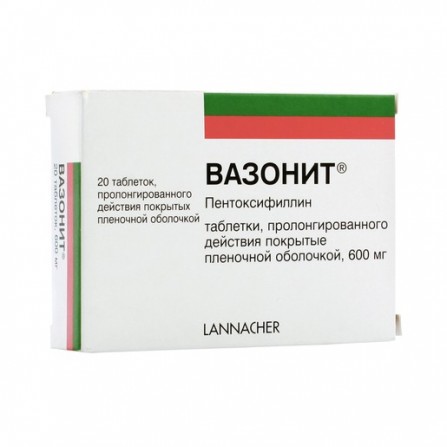Vasonit pills film-coated retard 600mg N20
Condition: New product
991 Items
Rating:
Be the first to write a review!

More info
Active ingredients
Pentoxifylline
Release form
Pills
Composition
1 tablet contains: Active substance: pentoxifylline 600 mg; Excipients: hypromellose 15000 mPa * s, microcrystalline cellulose, crospovidone, colloidal silicon dioxide, magnesium stearate; Shell composition: macrogol 6000, hypromellose 5 mPa * s, anti-foam agent SE2 MK silicon, titanium dioxide, talc, polyacrylate dispersion 30%.
Pharmacological effect
Vasonit is an angioprotective, antiagregative, vasodilator. Improves microcirculation and rheological properties of blood. It inhibits phosphodiesterase, contributing to the accumulation of cAMP in tissues and organs, including in the cells of the smooth muscles of blood vessels, in the blood cells. It inhibits the aggregation of platelets and erythrocytes, increases the elasticity of their membrane, lowers the concentration of fibrinogen in the plasma and enhances fibrinolysis. It improves the supply of oxygen to tissues, to the greatest extent in the limbs, the central nervous system and, to a lesser extent, in the kidneys. Slightly dilates coronary vessels.
Pharmacokinetics
When taking pills inside ensured continuous release of the active substance and its uniform absorption from the gastrointestinal tract. Metabolized in the liver during the "first pass", resulting in a number of pharmacologically active metabolites. Cmax of pentoxifylline and its active metabolites in plasma is reached in 3-4 hours and remains at the therapeutic level for 12 hours. It is mainly excreted in the urine as metabolites.
Indications
Peripheral circulation disorders (intermittent claudication on the background of diabetic angiopathy, endarteritis obliterans), Raynaud’s disease, tissue trophic disorders (post-thrombotic syndrome, varicose veins, trophic ulcers of the leg, gangrene, frostbite) disorders of cerebral circulation: ischemic and postapoplexic conditions; cerebral atherosclerosis (dizziness, memory disorders, sleep disorders), dyscirculatory encephalopathy, viral neuroinfection (prevention of possible microcirculation disorders); IHD, condition after myocardial infarction; acute circulatory disorders in the retina and choroid; otosclerosis, degenerative changes on the background of the pathology of the vessels of the inner ear with a gradual decrease in hearing; COPD, bronchial asthma; impotence of vascular genesis.
Contraindications
Hypersensitivity to pentoxifylline, etc.xanthine derivatives; acute myocardial infarction; porphyria, massive bleeding, hemorrhagic stroke, retinal hemorrhage, pregnancy, lactation. C caution: lability of blood pressure (susceptibility to hypotension), CHF, peptic ulcer and 12 duodenal ulcers (for ingestion), condition after recent surgical interventions, hepatic and / or renal failure, age up to 18 years (efficacy and safety not studied).
Use during pregnancy and lactation
The use of the drug Vasonit during pregnancy is contraindicated. If necessary, the use of the drug during lactation should stop breastfeeding.
Dosage and administration
The enteric coated pills are swallowed whole with a small amount of water. The daily dose is divided into 3 doses. The initial dose is 600 mg / day. As the state improves, the dose can be reduced to 300 mg / day. Prolonged dosage forms prescribed 2-3 times a day.
Side effects
On the part of the digestive system: possible - nausea, vomiting, diarrhea, dry mouth, loss of appetite, feeling of fullness in the abdomen, epigastric pain, increased activity of liver enzymes (ALT, AST, LDH) and ALP, cholecystitis, hepatitis, jaundice; rarely - an unpleasant taste in the mouth, hypersalivation. From the side of the central nervous system: relatively rare - headache, dizziness, anxiety, sleep disturbances, convulsions. For the senses: rarely - conjunctivitis, scotoma, blurred vision, ear pain. On the part of the cardiovascular system: when using the drug in high doses, a decrease in blood pressure, tachycardia, angina, heart rhythm disturbances, flushing of the skin of the face, flushing of the skin of the face and upper chest, edema are possible. Allergic reactions: possible - itching, skin rash, urticaria, angioedema; rarely - anaphylactic shock. On the part of the hematopoietic system and hemostasis: rarely - bleeding (from the vessels of the stomach, intestines, skin and mucous membranes), thrombocytopenia, leukopenia, pancytopenia, hypofibrinogenemia, changes in peripheral blood, aplastic anemia. In this regard, it is necessary to conduct regular monitoring of the blood picture.Other: rarely - malaise, increased fragility of the nails, changes in body weight, nasal congestion.
Overdose
Symptoms: nausea, dizziness, decrease in blood pressure, fever (chills), tachycardia, drowsiness or agitation, loss of consciousness, areflexia, tonic-clonic convulsions, vomiting like coffee grounds (as a sign of gastrointestinal bleeding), arrhythmias are possible. Treatment: gastric lavage, further symptomatic therapy. The specific antidote is absent. In the case of vomiting with traces of blood, gastric lavage is unacceptable.
Interaction with other drugs
Pentoxifylline may enhance the effect of drugs affecting the blood coagulation system (indirect and direct anticoagulants, thrombolytics), antibiotics (including cephalosporins - cefamandol, cefeperazone, cefotetan), valproic acid. Increases the effectiveness of antihypertensive drugs, insulin and oral hypoglycemic drugs. Cimetidine increases the concentration of pentoxifylline in plasma (the risk of side effects). Joint appointment with other xanthines can lead to excessive nervous excitement of patients.
special instructions
Treatment should be under the control of blood pressure. In diabetic patients taking hypoglycemic drugs, the appointment in large doses can cause severe hypoglycemia (dose adjustment is required). When administered simultaneously with anticoagulants, it is necessary to carefully monitor blood coagulation parameters. In patients who have recently undergone surgery, systematic monitoring of Hb and hematocrit is necessary. The dose should be reduced in patients with low and unstable blood pressure. Older people may need to reduce the dose (increased bioavailability and reduced rate of excretion). The safety and efficacy of pentoxifylline in children is not well understood. Tobacco smoke can reduce the therapeutic efficacy of the drug. The compatibility of the pentoxifylline solution with the infusion solution should be checked in each particular case.




